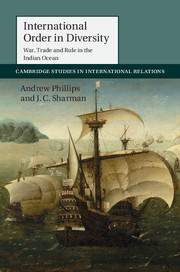Book contents
- Frontmatter
- Contents
- List of maps
- List of tables
- Acknowledgements
- Introduction
- 1 The puzzle of durable diversity in International Relations
- 2 The initial growth of diversity, 1500–1600
- 3 The expansion of diversity and competition under heteronomy, 1600–1650
- 4 The stabilization of diversity, 1600–1750
- 5 Reconfiguring diversity in the age of empire, 1750–1900
- Conclusion: Order in diversity
- Bibliography
- Index
- CAMBRIDGE STUDIES IN INTERNATIONAL RELATIONS
4 - The stabilization of diversity, 1600–1750
Published online by Cambridge University Press: 05 May 2015
- Frontmatter
- Contents
- List of maps
- List of tables
- Acknowledgements
- Introduction
- 1 The puzzle of durable diversity in International Relations
- 2 The initial growth of diversity, 1500–1600
- 3 The expansion of diversity and competition under heteronomy, 1600–1650
- 4 The stabilization of diversity, 1600–1750
- 5 Reconfiguring diversity in the age of empire, 1750–1900
- Conclusion: Order in diversity
- Bibliography
- Index
- CAMBRIDGE STUDIES IN INTERNATIONAL RELATIONS
Summary
Europeans were first able to enter the Indian Ocean international system in large part because their maritime goals did not threaten powerful, land-based Asian empires. Subsequent competition between different European polity forms – the state-like Estado da Índia and English and Dutch company sovereigns – saw the sovereign state lose out to company sovereigns. The latter emerged as the West's most militarily and commercially successful polity form east of the Cape of Good Hope. How did the resulting international system work? This chapter explains how European and local actors learned to mediate their diplomatic and commercial relations with one another, and thus perpetuate regional polity diversity.
That Europeans proved so successful in insinuating themselves into the Indian Ocean international system is surprising. As we have already established, Europeans did not enjoy any overwhelming military preponderance over local actors, notwithstanding a niche advantage in naval warfare that the most powerful Asian polities were unwilling to copy. On land, Europeans were always vastly outnumbered and in most instances remained sorely dependent on the goodwill of locals to secure trading privileges. Likewise, while Europeans were drawn to the region by the promise of spices and textiles, they had little to offer locals in exchange for these products, aside from American silver and gold. Access to this silver and gold quickened monetization and state-building throughout the Indian Ocean littoral. This strengthened local incentives to make space for European entrants into the region. But Europeans could not count on any commercial indispensability to win them access to indigenous rulers and markets. Lastly, having had little direct contact with locals prior to the sixteenth century, the Europeans shared few if any cultural affinities with prospective diplomatic and trading partners to ease their entry into the region. On the contrary, European religious bigotry and a reciprocal cultural chauvinism between Europeans and locals augured ill for the development of cooperative relations.
- Type
- Chapter
- Information
- International Order in DiversityWar, Trade and Rule in the Indian Ocean, pp. 137 - 165Publisher: Cambridge University PressPrint publication year: 2015



